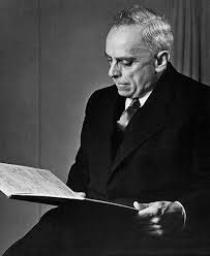Volkmar Andreae
Volkmar Andreae was born on 5 July 1879 in Bern (Switzerland). He received his first piano lessons as a child with Karl Munzinger. After school he studied at the Cologne Conservatory under Fritz Brun, Franz Wüllner, Isidor Seiss and Friedrich Wilhelm Franke from 1897 to 1900.
After his studies Volkmar Andreae first was active both as a composer and conductor. He composed 20 works between 1900 and 1910 which received immediate performances and good reviews. But he more and more focused on his work as a conductor and so the number of compositions dropped considerably over the years. Between 1910 and 1920 Volkmar Andreae only finished 10, and in the ensuing 40 years another 13 works. This makes a complete output of 43 compositions.
Volkmar Andreae's conducting career started in 1902 when he took over the leadership of the Mixed Choir of Zürich, where he remained until his retirement in 1949. From 1906 to 1949 he also led the Tonhalle Orchestra Zürich and became a sought-after guest conductor. For example he was offered to succeed Gustav Mahler as conductor of the New York Philharmonic Orchestra in 1911, but he declined. Volkmar Andreae championed especially the symphonies of Anton Bruckner and made the first ever recording of his complete symphony cycle. But Volkmar Andreae also supported the contemporary Swiss composers. In 1922 he was a founding member of the Swiss branch of the International Society for Contemporary Music (ISCM) and conducted several times at the ISCM World Music Days.
From 1914 to 1939 Volkmar Andreae was also director of the Zürich Conservatory and from 1920 to 1925 head of the Swiss Composers Society (Schweizer Tonkünstlerverein).
Volkmar Andreae died on 18 June 1962 in Zürich (Switzerland).
The work catalogue of Volkmar Andreae contains an opera, a symphony, Little suite for orchestra, Music for orchestra, a violin concerto, a rhapsody for violin and orchestra, an oboe concertino, a divertimento for flute and strings and a "Morceau de concert pour fanfare militaire".
The vocal music includes several songs and choral works as well as compositions with orchestral accompaniment like Li-tai-pe for tenor and orchestra and Das Göttliche op.2, Charons Nachen op.3, the Symphonic fantasy op.7 or Magentalied op.28, all for solo, choir and orchestra.
The chamber music of Volkmar Andreae offers piano pieces, a violin sonata, 2 piano trios, a string trio and 2 string quartets.
Sinfonische Fantasie op.7
In my possession is the manuscript of the full score of the "Sinfonische Fantasie op.7" by Volkmar Andreae. The work is scored for tenor solo, tenor choir, orchestra and organ. It was composed in 1903 on a text by Walter Schädelin titled "Schwermut, Entrückung, Vision" (which is also the subtitle of the work). The composition is dedicated to Friedrich Hegar, the former conductor of the Tonhalle Orchestra in Zürich. The premiere took place on 15 December 1903 in Zürich with the Tonhalle Orchestra under Friedrich Hegar.
The manuscript in my possession is the fair copy of the full score, penned down by a copyist "F. Röser" in Bern. The title page has an autograph dedication by Volkmar Andreae to the "ausgezeichneten Schwester-Künstler Herrn Kunstmaler Württemberger zur freundlichen Erinnerung" and is dated 1 July 1904. Probably the mentioned painter could be Ernst Würtenberger who lived in Zürich since 1902 and was a good friend of Hermann Hesse (like Volkmar Andreae).
The fact that the fair copy was done by a copyist is common for the early works by Volkmar Andreae. The Zürich City Archive - where the musical estate of Volkmar Andreae is archived - holds similar examples for op.2, 3 and 6.
The score of the Sinfonische Fantasie op.7 was published in 1904 by Gebrüder Hug. The Zürich City Archive only holds two copies of the printed score, but no manuscripts of this composition.
The work itself received enthusiastic reviews after its premiere and received several subsequent performances in the next years. Richard Strauss is quoted in the Neue Zürcher Zeitung from 1 July 1904 (talking about the Swiss Composers Festival which took place in Bern on 25/26 June 1904 and saw another performance of the Symphonic Fantasy):
"The Symphonic Fantasy by Volkmar Andreae, premiered last winter in Zürich, recently caused a sensation at the Composer Festival in Frankfurt a. M. as is generally known. For that reason many German orchestras put the work into their programs for next season. The creation unfurls such a large tension, there is so much compositional power, that the listener is dragged away irresistably."
